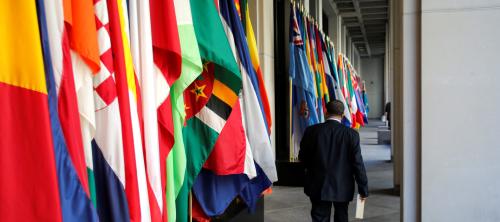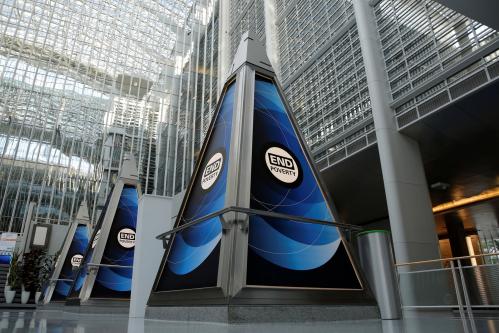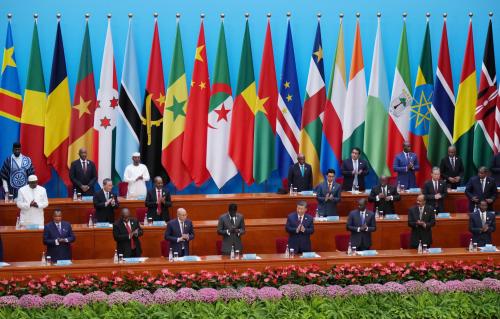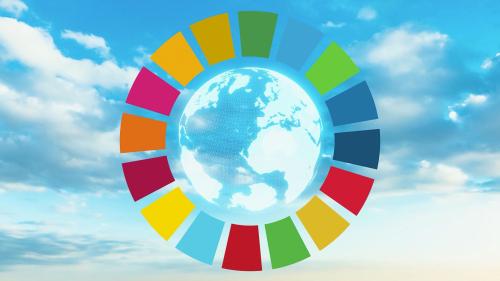The report of the G-20 Eminent Persons Group (EPG) on Global Financial Governance, chaired by Singapore’s Deputy Prime Minister Tharman Shanmugaratnam, released this week at the Annual Meetings of the IMF and World Bank in Bali, offers consequential ideas for making the global financial system work for all. The report covers development finance as well as reforms for global financial resilience. This post summarizes the content of the development finance portion.
The EPG report makes three basic points on development finance:
- The world needs a better system to achieve development impact through promoting economic stability and sustainable growth, and it needs it now.
- This requires global development finance institutions to work together as a system, rather than as separate entities.
- A new governance structure should provide coherence across key institutions to ensure that the system works well across all its component parts.
Each of these points represents a fresh perspective on the global economy. Together, they could result in radical change.
Why change, why now?
We all know that the world is a very different place from the world at the time of the creation of the Bretton Woods institutions. There are new poles of global economic growth, most people live in middle class or rich households, economies are more interconnected, technology is advancing everywhere, and the private sector now plays a dominant role in finance, innovation, and investment driving development forward.
At the same time, pressing problems of conflict, of climate change and other planetary boundaries, and of inequality and instability demand attention by national policymakers. These, in turn, are increasingly hamstrung by the global environment. What the report terms a “cooperative international order” is required to allow countries to develop by relying on a global system that avoids systemic crises stemming from volatility in capital flows, mass migration, conflict and poverty, or the environment.
This is the system we want, not the system we have.
We have a decade to put in place a better system. Within a decade, we will build more infrastructure than the world’s current stock. Make it environmentally sustainable and there is a chance to control temperature rise. Otherwise, the IPCC report on global warming lays out the dire consequences.
In a decade, nine in 10 of the world’s poor people are likely to be in Africa. Africa will add 334 million job seekers by 2030. They need skills and opportunities, or else could become a source of instability.
Damaging temperature rise and a generation of hundreds of millions of young people facing limited opportunity could be the irreversible consequences of not putting in place a more cooperative international order.
Multilateral development banks should work together as a system
Multilateral development banks (MDBs) have made extraordinary contributions to development, but the urgency and scale of global development challenges require a stepped up role for the MDB system. The current pace of MDB activities will not achieve the results that the world has set out. They could do more with more resources, but they could also change their approaches to be much more effective. The report recommends the latter and argues for the MDBs to act and think like a system that multiplies the impact of individual activities.
The multiplication comes from the MDBs’ ability to reinforce policy reform and regulation at the sector and macroeconomic levels to ensure sustainability and impact. It also comes from their ability to scale-up national programs by identifying projects, making them bankable and supervising them through implementation. MDBs also have a unique capacity to bring a range of appropriate financing to the table. MDB financing instruments include grants, technical assistance, equity, low-cost long-term loans, and guarantees, each of which can be deployed as catalysts to attract private investment at scale.
In a system approach, the multipliers of the MDBs would be strengthened and fragmentation would be reduced. The report recommends they pay attention to jointly created country platforms that would allow all development partners to coordinate their activities and adhere to common standards—on debt sustainability, environment, social and governance standards, coherent pricing (including of technical assistance), procurement, capacity building, transparency, and anti-corruption measures. Such platforms would permit developing countries to scale up, to blend official and private finance, to promote fair competition, and to prioritize investment plans and sector reforms. They would put countries in the driver seat and give teeth to the long-standing principle of country ownership.
A system approach would also allow MDBs to identify and focus on the pieces of the investment chain that have long been missing or at least undervalued: project identification as well as risk mitigation and diversification. Taking a risk lens is useful at both country and international levels. At the country level, political risk insurance and the development of a standardized, large-scale asset class for diversified developing country infrastructure assets can best be done using the portfolios of projects that country platforms will provide. At the international level, the MDBs can together make their voice heard to obtain more evidence-based treatment from international regulators in terms of their regulatory capital and prudential norms. This could free up significant additional resources for these institutions.
A third example of the benefits of a system approach is in tackling problems related to the global commons where currently governance is unclear, plans and mandates of individual institutions are blurred, and resources and responsibilities are self-assessed and fragmented. As a result, the global commons are not integrated into MDB core operations and their neglect is already imposing significant costs on country clients.
A new global governance structure
While there is a lot that the MDBs can do among themselves, improved shareholder alignment and governance is needed. There is currently no global forum to discuss and monitor either the pace and nature of results being achieved, nor to take on the reforms of the MDB system that the report outlines.
Here, the G-20, more specifically the G-20 finance ministers, have a distinct role to play. G-20 members are the principal shareholders in all the major international financial institutions, and as such, they have a strong interest in the creation of a more coherent system for development finance. They are also well placed to balance the trade-offs and judgments that will be required—how much debt tolerance should the system take on, what are the risks of development inaction and how can these be mitigated? How can the system cooperate with other development actors, in the business and philanthropic communities, for example?
“The ambition is in the doing”
The report presents a set of reasonable reforms, many of which have been in the making for some time. Its value lies in each of the three areas noted above.
- It provides a sense of urgency with words that leave no room for misunderstanding: “the present international monetary and financial system lacks the coherence, joint capacity, and effectiveness to support these (the global community’s) goals.”
- It outlines new approaches that could improve system-wide effectiveness and development impact.
- It sets out a road map for implementation.
- It ends with a note of caution. All the G-20 shareholders do not yet share the same sense of urgency, nor do they recognize that a transition to a system-wide approach is necessary. In some cases, shareholders could be described as being in a state of active inertia—willing to talk about reform but without being willing to provide the political leadership needed to drive change.
This is the crux of the issue at hand. Do the shareholders of the MDBs have the vision to embrace cooperative internationalism in this new way, or will they revert to business-as-usual, with all the dangers that represents?
The non-official international community could play a key role in monitoring and holding the G-20 accountable for implementation of the EPG recommendations. Already, the EPG has involved thought leaders from across the world in their deliberations. Now, all those who are friends of the EPG should band together to ensure that the doing matches the ambition of this report.
The Brookings Institution is committed to quality, independence, and impact.
We are supported by a diverse array of funders. In line with our values and policies, each Brookings publication represents the sole views of its author(s).








Commentary
Systems thinking for multilaterals: New report on global financial governance
October 12, 2018